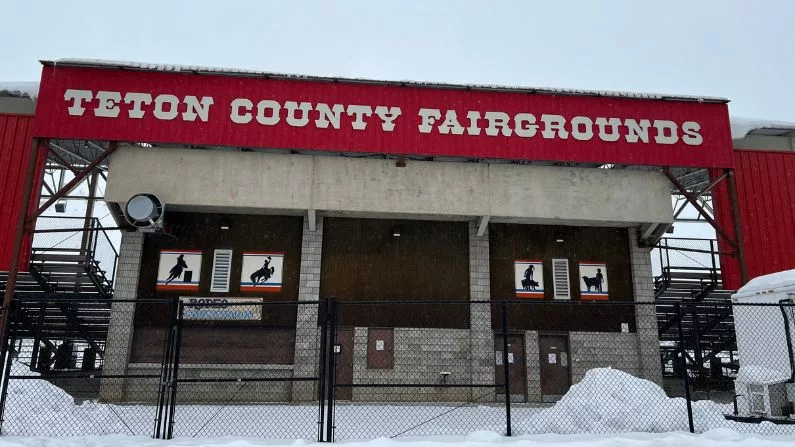Lawmakers from across Wyoming gathered in Cheyenne on Jan. 17 to weigh in on one of Teton County’s most controversial issues: the Jackson Hole Rodeo and the future of the Teton County Fairgrounds.
The local advocacy group, “Save the Rodeo Grounds,” hosted the event at the Little America Hotel in hopes of gaining statewide support to defeat a housing project, after failing to influence decisions on the local level. They gave out free bottles of wine. Wyoming’s new congresswoman, Harriet Hageman, also attended.
“This is a cancer that is going to spread through the state,” one of the group’s organizer’s Rebecca Bextel, told the crowd, referring to herself as a “political refugee” from California. “We are going to stand up for our Western heritage.”
Just days later, state lawmakers — who represent districts outside of Teton County — introduced a bill that could designate the Teton County Fairgrounds as a “state historic site” and rename it after Lance Cpl. Rylee McCollum, a Jackson marine who was killed in Afghanistan in 2021.
The move is the latest in a string of attempts by some conservative Teton County residents to bypass an overwhelmingly progressive local government by bringing issues to the state level. It’s also part of a years-long effort to protect the fairgrounds from what the group sees as overreach from the town of Jackson.
In August, the town council approved an affordable housing project, which is slated to be built on a town-owned acre of land across from the rodeo arena at the site of a dilapidated exhibit hall. Officials have said they see this 48-unit building as one way of addressing the town’s dire housing crisis, but critics argue it as just another instance of local officials whittling down what they see as part of the historic 26 acres of fairgrounds.
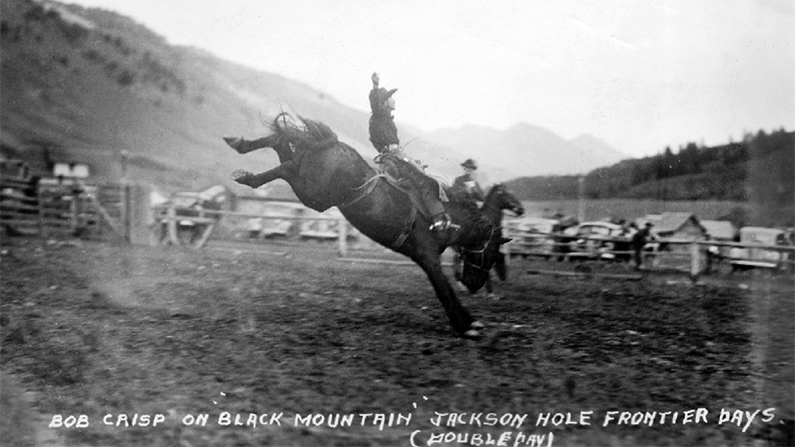
Historic photos of the rodeo arena in Jackson Hole from the 1950s and ‘60s were distributed in September along with a historic survey conducted by the Teton County Historic Preservation Board. (Jackson Hole Historical Society & Museum)
The housing project won’t be built on land currently leased for the fairgrounds. Still, the recently introduced bill, HB 218, would designate all 26 acres as historic and, if it passes, have the potential to halt the housing project in its tracks.
“I just hope that the folks in Jackson have a turnaround,” one of the bill’s sponsors, Rep. John Winter (R-Thermopolis) said in a voicemail to KHOL. “It’s pretty important to Wyoming and Jackson itself.”
The other sponsor on the bill, Sen. Lynn Hutchings (R-Cheyenne), didn’t respond to requests to comment about the bill, and Bextel declined to provide further comments to KHOL.
State, county and town officials KHOL spoke with couldn’t point to any precedent for this kind of move, which they say could constitute a state takeover of town land.
Behind closed doors
The Save the Rodeo Grounds group invited all state lawmakers to the Jan. 17 reception.
“We need more cowboys and less development in our state,” reads the publicly available online invite.
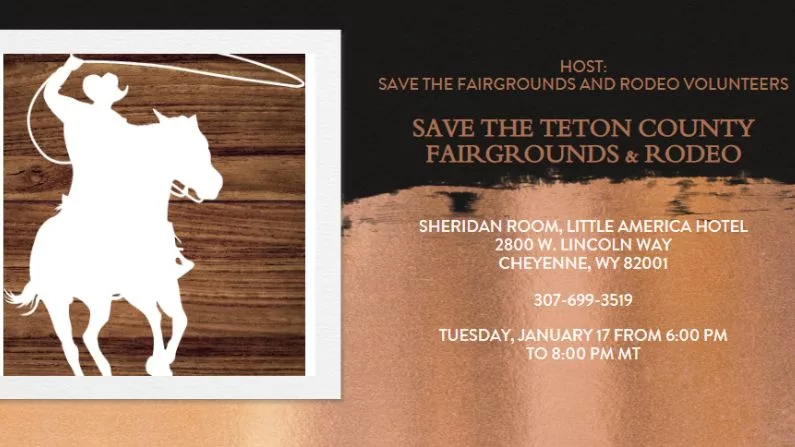
The invite sent to state lawmakers read, “You are our state’s champions – help us fight for Wyoming’s Western way of life.” (Save the Rodeo group Evite)
For one of Teton County’s representatives, Mike Yin (D-Jackson), the invite seemed to come as a surprise.
“I am a little disappointed that they have never reached out to me to discuss the issue,” Yin wrote in a Jan. 16 email to lawmakers in which he provides additional context about the fairgrounds issue.
But, for another local lawmaker, Andrew Byron (R-Hoback), the invite was more expected. He said a lawyer with the Save the Rodeo Grounds group had approached him two weeks prior and asked him to sign onto the bill. Byron declined to sponsor the bill, since it’s his first session in Cheyenne.
Bryon said, as a Republican, he’s hesitant to micromanage local politics and called it an “overstep” for lawmakers to be sponsoring bills about issues outside of their districts.
“It rubs me certainly the wrong way that these attempts are being made,” Byron said. “And I think that is the consensus of some of my colleagues too.”
They’re not the only ones. Teton County Commissioner Luther Propst attended last week’s event in his capacity as Rep. Liz Storer (D-Jackson)’s husband. He later provided KHOL an audio recording of the presentation.
Speaking to KHOL, Propst had questions about how the town land would be designated a historic site and who would manage the fairgrounds. Currently, the town leases the land to the county, which manages it through a volunteer board.
Propst questioned why state lawmakers are getting involved with local zoning issues.
“I don’t understand why the legislature is sending a message to every disgruntled person in Teton County that they wish to be our zoning board of appeals,” Propst said.
This isn’t the first time Teton County residents have taken their concerns to the state level when unsatisfied with the local response. Jackson’s legislative advisor, former state representative Andy Schwartz, pointed to an instance in 2019 when the legislature passed a bill stripping counties of zoning authority over private schools — the result of Teton County residents objecting to local decisions.
“We’re always at a slight disadvantage,” Schwartz said. “We’re not loved by the rest of the state. There is a sense in Cheyenne, in the Capitol building, that, in some way, the fair and the rodeo are being disrespected.”
Schwartz said he was not invited to attend the Jan. 17 meeting in Cheyenne about the future of the Jackson Hole Rodeo and the Teton County Fairgrounds, since he’s a lobbyist.
Some local residents who are closely involved with the fairgrounds. like Zach Vosika, who chairs the fairgrounds advisory board, say they are supportive of a longer term solution for the fairgrounds. He said he thinks space is limited at the current grounds and supports building a “world-class events complex” somewhere else in the county, but didn’t point toward any potential locations for a new fairgrounds.
Few official conversations have happened about relocating the fairgrounds, which is currently protected by a lease with the town that goes through 2030.
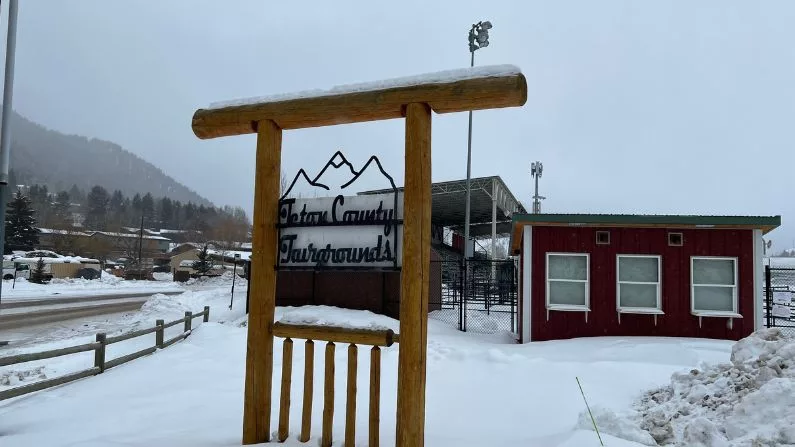
The Teton County fair and rodeo grounds have been in the same location for more than 80 years, but some say it’s time for it to move. (Tyler Pratt/KHOL)
HB 218 states “there are plans to utilize the remaining acreage of the fairgrounds for housing” once that lease expires, though town and county representatives say there are no such plans.
Vosika said the fairgrounds board wasn’t involved in discussions about the rodeo legislation and also believes those conversations should remain on the local level.
“We have kind of been left in the dark,” he said.
The bill’s language stipulates that it’s up to the Department of State Parks and Cultural Resources to figure out the details of the historic site designation, but a representative of the agency said they’ve also been left out of the conversation.
According to Gary Schoene, the agency’s public relations officer, historic sites are typically created on state-owned land. He said it’s unclear if the bill would require the state to buy the town’s land and if it’s legal for the state to even designate town property as historic.
“We’re just in a wait and see mode,” Schoene said.
Schwartz, the town’s lobbyist, said that the legislature doesn’t determine the constitutionality of bills.
“Ultimately, if this bill passes and it goes to court, then the courts decide,” he said.
Addressing the housing crisis
Even though this issue is making it to the state level, Jackson has different housing needs compared to the rest of the state. As of last spring, 5,300 units were needed to address the current affordability crisis for local residents, according to the Regional Housing Needs Assessment.
At the Jan. 17 event, even Bextel — the rodeo group leader — said that Jackson has a housing problem, but she believes that some places are off limits.
A few days after the meeting, which Rep. Harriet Hageman attended, she visited Teton County for a town hall.
“Taking away your Western heritage is not going to solve your long-term problem with housing,” Hageman said in a conversation with press following the town hall. “There’s going to have to be other solutions.”
Hageman added that the town instead tap into federal forest service land to meet its housing needs.
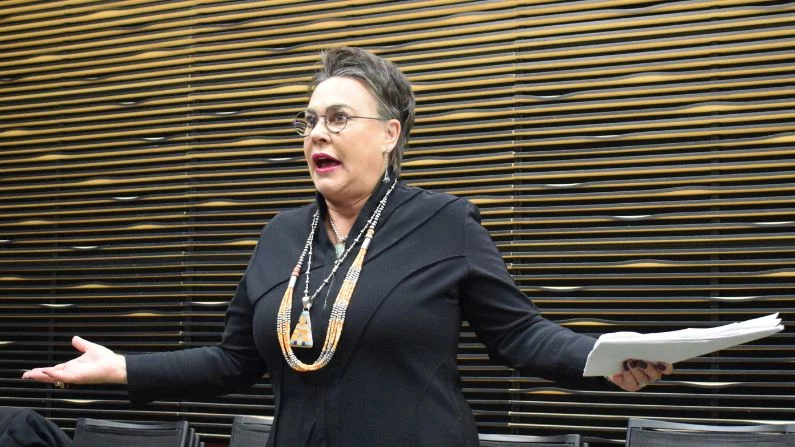
Rep. Harriet Hageman held a town hall in Jackson on Jan. 20, in which she supported the “Save the Rodeo Grounds” campaign. (Hanna Merzbach/KHOL)
Clare Stumpf, who leads housing advocacy group ShelterJH, said deed-restricted housing — like the town is building adjacent to the fairgrounds — is critical for helping the lowest income workers. This includes people earning less than $52,000 for one person and about $74,000 for a family of four.
“These are people who are definitely contributing to our community,” Stumpf said. “They’re the most vulnerable because they have the most gap, so to speak, between what their earnings are and what they can afford here.”
Stumpf said she wasn’t surprised by the proposed legislation, deeming it another bill eroding local control. She said that it is “ironic” since “local control is such a foundation of conservative thinking.”
She added that she didn’t think the bill would ultimately pass because she’s unsure how the issue will stack up against the legislature’s long list of priorities this session.
Byron, one of Teton County’s only Republican representatives, made the same point. He’s supportive of the rodeo staying put, but is undecided if this bill is the way to get there.
“It’s always concerning when we’re adding government and adding oversight to a local issue that I really am confident we can solve locally,” he said.
Still, even if the bill doesn’t pass, Byron referred to it as a wake up call.
“There are a lot of people that are passionately in supportive of Western heritage,” Byron said. “I think it’s probably an eye opener for some of the local electeds [sic] that are now realizing how serious this subject is.”
HB 218 was assigned to the House’s Travel, Recreation, Wildlife & Cultural Resources Committee. A public hearing has yet to be scheduled.

